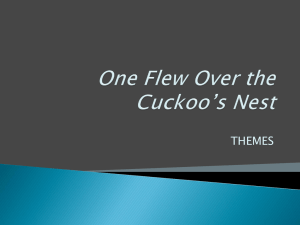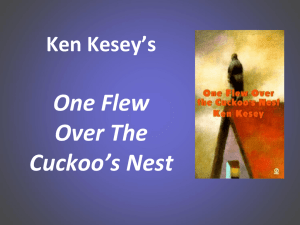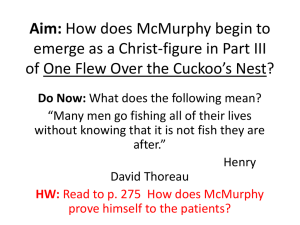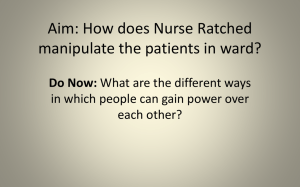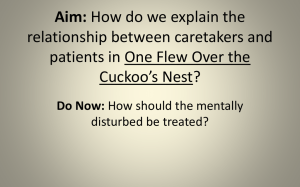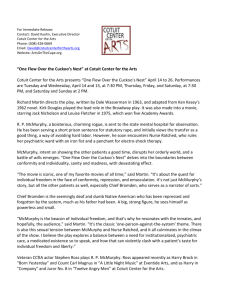Rivera Jayline Rivera Ms. Forlini English Block 3 25 May 2013
advertisement
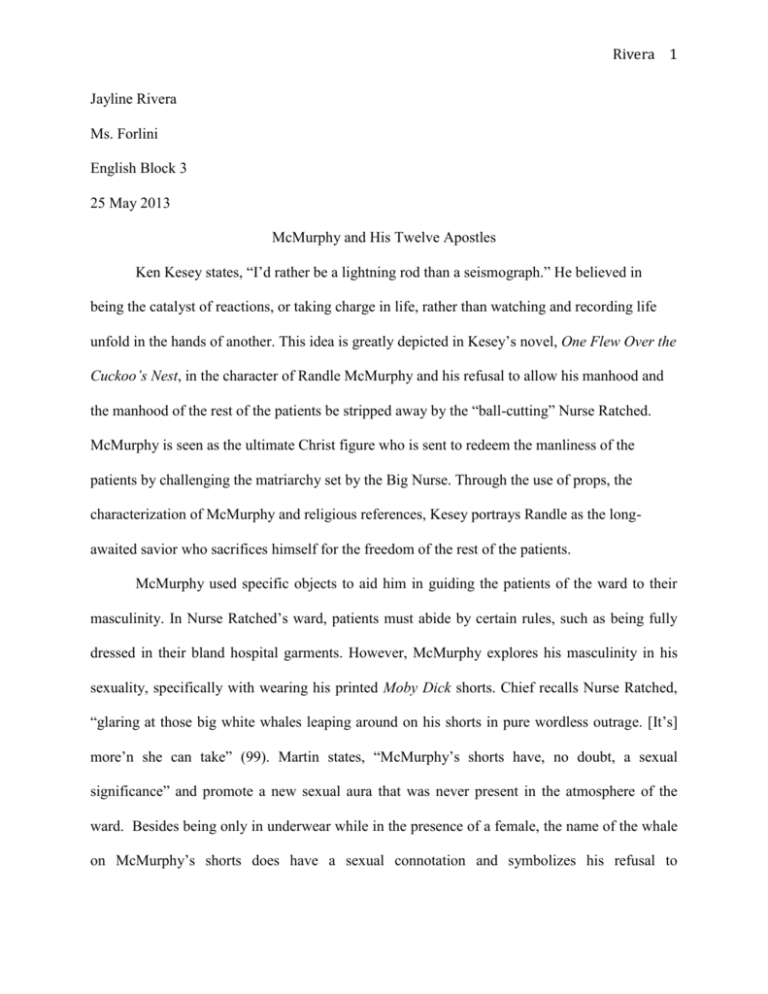
Rivera 1 Jayline Rivera Ms. Forlini English Block 3 25 May 2013 McMurphy and His Twelve Apostles Ken Kesey states, “I’d rather be a lightning rod than a seismograph.” He believed in being the catalyst of reactions, or taking charge in life, rather than watching and recording life unfold in the hands of another. This idea is greatly depicted in Kesey’s novel, One Flew Over the Cuckoo’s Nest, in the character of Randle McMurphy and his refusal to allow his manhood and the manhood of the rest of the patients be stripped away by the “ball-cutting” Nurse Ratched. McMurphy is seen as the ultimate Christ figure who is sent to redeem the manliness of the patients by challenging the matriarchy set by the Big Nurse. Through the use of props, the characterization of McMurphy and religious references, Kesey portrays Randle as the longawaited savior who sacrifices himself for the freedom of the rest of the patients. McMurphy used specific objects to aid him in guiding the patients of the ward to their masculinity. In Nurse Ratched’s ward, patients must abide by certain rules, such as being fully dressed in their bland hospital garments. However, McMurphy explores his masculinity in his sexuality, specifically with wearing his printed Moby Dick shorts. Chief recalls Nurse Ratched, “glaring at those big white whales leaping around on his shorts in pure wordless outrage. [It’s] more’n she can take” (99). Martin states, “McMurphy’s shorts have, no doubt, a sexual significance” and promote a new sexual aura that was never present in the atmosphere of the ward. Besides being only in underwear while in the presence of a female, the name of the whale on McMurphy’s shorts does have a sexual connotation and symbolizes his refusal to Rivera 2 “desexualize.” As Martin explains, “McMurphy may represent the indomitableness of MobyDick himself: as Moby-Dick cannot be vanquished by the monomaniac Ahab, so the spirit of McMurphy cannot be quenched by the Combine.” As Moby Dick is unable to be overcome, McMurphy withholds the same characteristics and cannot be restricted by Nurse Ratched or the Combine. Besides his shorts, McMurphy uses other key props to relinquish the masculinity of the patients- alcohol and prostitutes. Harding first describes himself and the rest of the ward as lack[ing] the sexual ability to make the grade as adequate rabbits” (69). However, in the midst of the party scene, the men experience life as men, without having to fear the wrath of Nurse Ratched. Unlike the Big Nurse, prostitutes “Candy and Sandy evoke attitudes of freedom and openness rather than of restraint and confinement” (Martin). From this exposure to alcohol and non-emasculating women, the men of the ward transform into sick men… no more rabbits” (276). Braud expands this explanation by stating, “the sexual component to this scene is important for the characters in the novel, who seem to be emasculated…. After their exposure to this wilder side of masculinity, Dale hatches a plan for escape, and Billy becomes more assertive.”The transition from sick rabbits to sick men came from the efforts of McMurphy, in his attempts to provide opportunities for the men to enjoy their sexuality and indulge in the actions that define masculinity- sexual behavior and drinking booze. The character of McMurphy helps him spread his influence and rebellious ideas to the rest of the men on the ward. When McMurphy first arrives at the hospital, he notices there is no laughter, no freedom, or individuality under the dictatorship of Nurse Ratched. Nurse Ratched has not only stripped the men of their masculinity but also of any opportunity that would allow the patients to fully indulge in joyous activities. However, McMurphy isn’t under her wing and Rivera 3 it’s his ability to remain himself and laugh at even the worst things that not only inspire the men but also brings them together. This is apparent in the fishing scene, where the laughter: “…started slow and pumped itself full, swelling the men bigger and bigger….see McMurphy surrounded by his dozen people, and watch them, us, swinging a laughter that rang out on the water in ever-widening circles, farther and farther, until it crashed up on beaches all over the coast, on beaches all over all coasts, in wave after wave after wave” (228). Martin addresses the community laughter as a symptom of a “growing sense of community among the patients… But his [McMurphy] capacity for laughter is fundamental to his identity as a character—along with his ability to make us laugh.” McMurphy’s ability to make the patients laugh and achieve this level of comfort in him represents his paternal role to the ward. The patients look to him for guidance because he portrays himself as not only one of them but as a consoler and defender. This is apparent in McMurphy’s debut in the ward. Chief recalls McMurphy as sounding “like he's way above them, talking down, like he's sailing fifty yards overhead, hollering at those below on the ground…[he] sounds big” (19). The patients in the ward “walk on their toes” due to the fear of crossing Nurse Ratched. However, McMurphy walks in with this sense of belonging and self-value that could not be taken down because his “individuality lends him a strength of personality and belief in himself that the other patients initially lack” (Simmons). During his arrival, McMurphy immediately began to socialize with the patients; “he [was] trying to get them to loosen up, the way you see an auctioneer spinning jokes to loosen up the crowd before the bidding starts” (27). This shows the immediate relationship McMurphy tried to build with the patients; he didn’t treat them like they were any less of him but interacted with them as men on equal standings but he wanted “to get them to regain their Rivera 4 confidence and to take risks. He wants to pump the inmates up to their full size” (Bruccoli). McMurphy’s character is greatly reflected when he attacked Nurse Ratched after Billy’s suicide, “only then did he show any sign that he might be anything other than a sane, willful, dogged man performing a hard duty that finally just had to be done, like it or not” (286). It reflects his love for not only Billy but for the rest of the men who are subjected to her emasculating reign; it shows he is not concerned with the consequences he will endure but his entire focus is on building up these men. In this impulsive action: “…he totally forgets himself in his act of love for the men in the ward. His momentary insanity, in the vain attempt to exact revenge for Billy Bibbit's death, underscores the prevalence of injustice in society's dictation of behavioral norms and in man's helplessness to stand alone against those norms. No greater love hath any man than to give his life for his comrade or comrades” (Baurecht). McMurphy genuinely cared for the men on the ward; he willingly sacrificed himself, knowing he would be committed longer to the hospital, to ensure the men were treated and acting like men. Religious references throughout One Flew over the Cuckoo’s Nest further depict McMurphy as the ultimate savior of the ward. At the beginning of the fishing trip, Chief recalls McMurphy leading “the twelve of us toward the ocean” (219). The number twelve is symbolic in the bible because it represents the twelve apostles and in the same way Jesus guided the apostles to sea and gave them courage after the journey, McMurphy has provided for the men in the ward. After the fishing trip, the patients return with the confidence that has been knocked down consistently by Nurse Ratched and “they grow strong enough to stand up for themselves and to push out into new frontiers…and like Jesus, [McMurphy] has inspired them to continue to enact the vision despite their limitations as mortal men” (Bruccoli). McMurphy performs many heroic Rivera 5 actions in order to save the men of the ward; unfortunately he must endure the consequences, which involve a series of electroshock therapy treatments. Ironically, the table where McMurphy is laying on while receiving his electroshock treatments is shaped as a cross. As they put the ointment on his head he requests, “Anointest my head with conductant. Do I get a crown of thorns?” (254-255). Braud concludes “this torture session makes him into even more of a Christ figure, suffering for his followers like Jesus” and McMurphy must is endure pain so that his followers, the men of the ward, may be free. However, his messianic journey does not end at these treatments. According to Braud, “following his Christ-figure path, McMurphy must be martyred.” In order for McMurphy to fully save the men, he must sacrifice himself by receiving a lobotomy and later be suffocated by his closest friend, Chief. Chief recalls, “The big, hard body had a tough grip on life. It fought a long time against having it taken away…Then I rolled off…I saw the expression hadn’t changed from the blank, dead-end look the least bit” (289). This ultimate sacrifice inspired the other patients to take charge of their own lives and many eventually checked out of the ward. In the same sense, after Jesus gave us his ultimate sacrifice, his followers felt inspired and continued to live out his work in their daily lives. Simmons adds, “McMurphy sacrifices his own life for the good of the other men, has obvious echoes of the biblical story of Jesus…he has managed to pass on his life-affirming sense of self-belief and selfworth to the other men. This positive message enables the patients to overcome their fear of Big Nurse and face the prospect of leaving the hospital for good.” Although he reaches death, the impact McMurphy leaves on the ward is similar to the impact Jesus left on Christians, they both created firm believers, not only in McMurphy or Jesus, but in the followers themselves. McMurphy is the prime example of a democratic savior. He embodies true Christ figure qualities and projects them through his actions and character. In addition, religious references Rivera 6 such as his crown of thorns or suffering on the table shaped as a cross further validate his messianic journey. Rivera 7 Works Cited Baurecht, William C. "Separation, Initiation, and Return: Schizophrenic Episode in One Flew Over the Cuckoo's Nest." New York: Chelsea House Publishing, 2008. Bloom's Literary Reference Online. Facts On File, Inc. Web. 1 Apr. 2013. Braud, Donovan. "One Flew Over the Cuckoo's Nest." New York: Facts On File, Inc., 2006. Bloom's Literary Reference Online. Facts On File, Inc. Web. 1 Apr. 2013. Bruccoli, Matthew J., and Judith S. Baugman. "Randle McMurphy." New York: Facts On File, Inc., 2009. Bloom's Literary Reference Online. Facts On File, Inc. Web. 1 Apr. 2013. Kesey, Ken. One Flew over the Cuckoo's Nest. New York: Viking, 1962. Print. Martin, Terence. "One Flew Over the Cuckoo's Nest and the High Cost of Living." New York: Chelsea House Publishing, 2008. Bloom's Literary Reference Online. Facts On File, Inc. Web. 1 Apr. 2013. Simmons, David. "Heroism in One Flew Over the Cuckoo's Nest." New York: Infobase Publishing, 2011. Bloom's Literary Reference Online. Facts On File, Inc. Web. 1 Apr. 2013. Simmons, David. "Identity in One Flew Over the Cuckoo's Nest." New York: Infobase Publishing, 2011. Bloom's Literary Reference Online. Facts On File, Inc. Web. 1 Apr. 2013.
